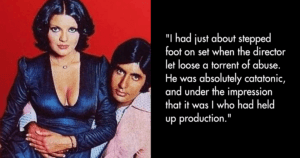Today is the International Sex Workers’ Day and yet, Google still calls it International Whores’ Day.
That says a lot about how society looks at them, doesn’t it?
Women who enter the profession of sex work mostly do it out of circumstances. Some are promised marriage by boyfriends who turn out to be pimps and some are sold off to brothels at ages as young as five. There are still some who are born to sex workers and are put to work at a young age, and some just look for brothels they can find refuge in, ironically, from poverty.
Yet, they earn themselves the label of ‘whores’ because of circumstances that pushed them into a trade that is looked down upon. We all know brothels exist but we refuse to acknowledge that the women running them also exist as a part of our own society. We call them names, consider their profession dirty and tag them as vicious. But they’re only providing the society with what it demands.
No one chooses this life and people who are in it are not as happy as you’d think.
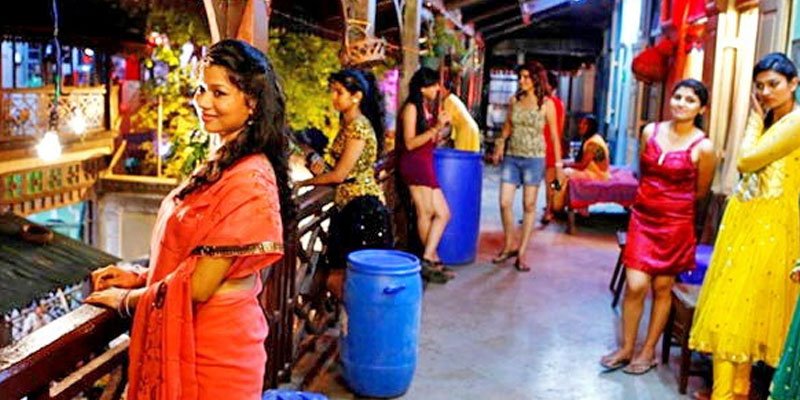
This interview of a 16-year-old Munni with UNODC highlights this very fact:
“I am sixteen now but I tell people I am twenty years old. I have been here for five years. When I was little, a man came to my house and said he will keep me in a palace and that I will marry a prince but I have to do as he says. He brought me to Kolkata and left me here at one of the dirtiest brothels promising to return but never showed up.”
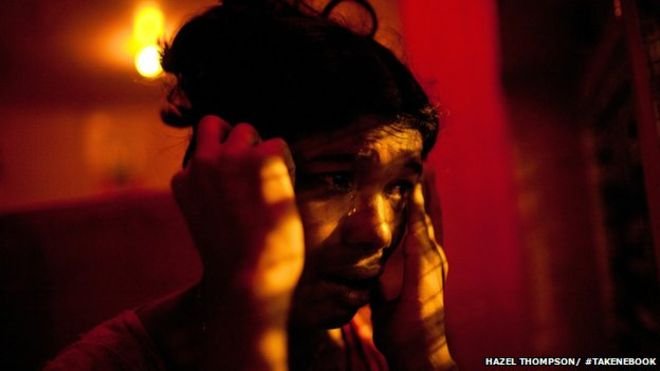
On being asked about her pay, she gave an answer that will break your heart:
“50 percent of the money earned from each customer goes to aunty. The customer has to separately pay 25 percent extra to her as service charge. Mainly college boys, lawyers, married men, some goras (foreigners), restaurant owners and taxi drivers come. At times the police raid the brothels but aunty slips them some money and offers her best girls to them. The business resumes again.”
Munni also talked about protection during sex:
“Even if we insist on condoms, customers pay an extra 25 percent as a bribe to the aunty.”
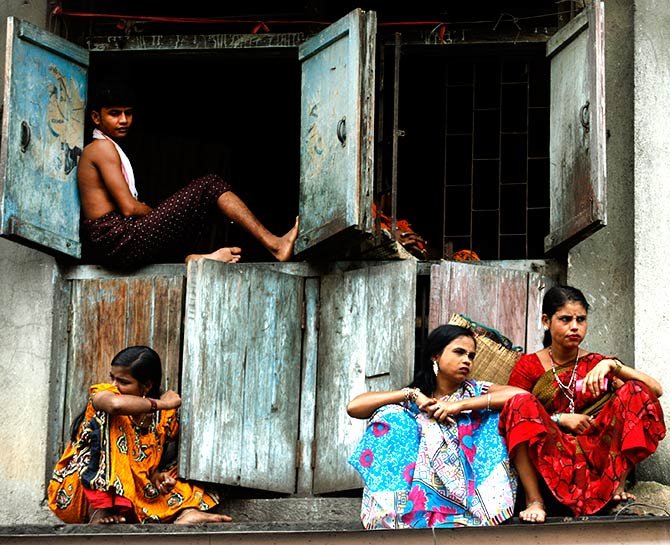
Munni comes from Sonagachi, the largest red-light district of not just India, but also South Asia. It is home to more than 11,000 sex workers which means there are more than 11,000 women whose rights need to be protected. In such a case, you’d assume that our nation would have put laws in place to make sure that sex workers, who are as it is at a vulnerable position, would not be harassed any further. However, this is far from true.
The problem lies in the ambiguous nature of the laws governing prostitution in India. For instance, the law in relation to “prostitution” is dealt with under Immoral Traffic (Prevention Act), 1956 as per which “Prostitution” is defined as “sexual exploitation or abuse of persons for commercial purposes”.
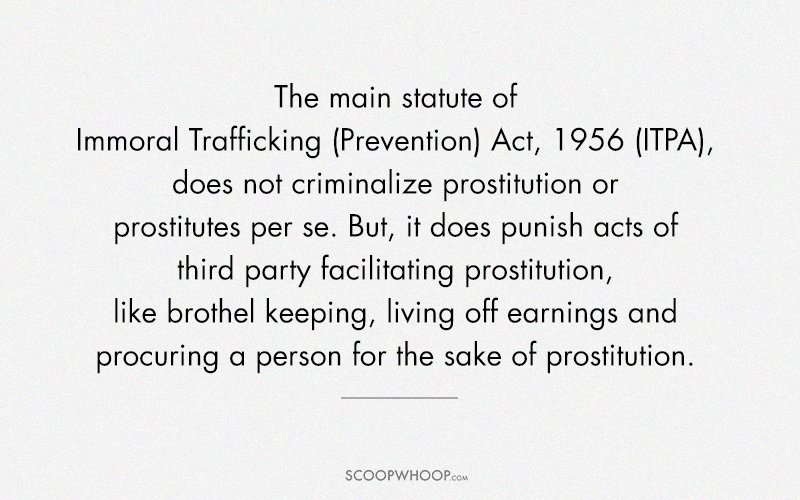
However, while the law does not explicitly deem prostitution per say as an offence, it still deems several other connected acts as criminal offences such as solicitation and seducing for the purpose of prostitution, inducing persons into prostitution, prostitution in public places, and operating a “brothel”.
Now, even though the law does not abolish prostitution, it still creates water tight limitations around the profession of sex workers where they are harassed unnecessarily by the authorities. The law states that:
You cannot carry on prostitution in the vicinity of a public place:
Thereby, excluding prostitutes from society and letting them know that they are not meant for public places.
Seducing for the purpose of prostitution:
The law does not, however, state how exactly a sex worker will gain clients without explicitly stating her services. In fact, if ‘caught’, the sex worker will be subject to 6 months imprisonment on conviction and/or ₹ 500 fine.
And operating a brothel:
Sex workers have very tightly-knit communities where each house is inhabited by sex workers who live like family. If they can’t have the public space, and neither can they have a roof over their heads, where are they supposed to go?
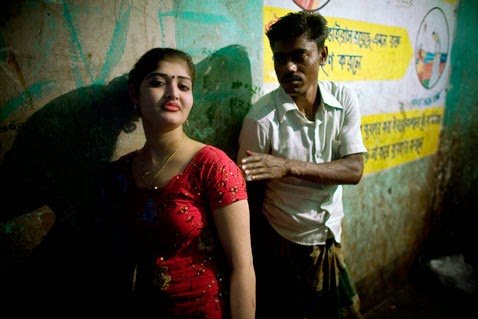
A sex worker being interviewed for The Accursed Tales Of Life In Sonagachi just sums up how messed up the Indian laws are for sex workers:
“The only thing the government has done for us is label us as ‘prohibited.’ Forget having access to a better life, we have been denied even the basic human right.”
Besides the legal complications, we also need a major “thought reform”.
In 2011, the Supreme court constituted a panel to look for measures to ensure better work conditions for prostitutes and protect their rights. On one hand, the panel reported that whenever there is a raid on a brothel, since voluntary sex work is not illegal and only running the brothel is unlawful, the sex workers should not be arrested, penalized, harassed or victimized. On the other hand, the panel reported that it must come up with suggestions for sex workers who wish to leave the profession and lead a “dignified life”.
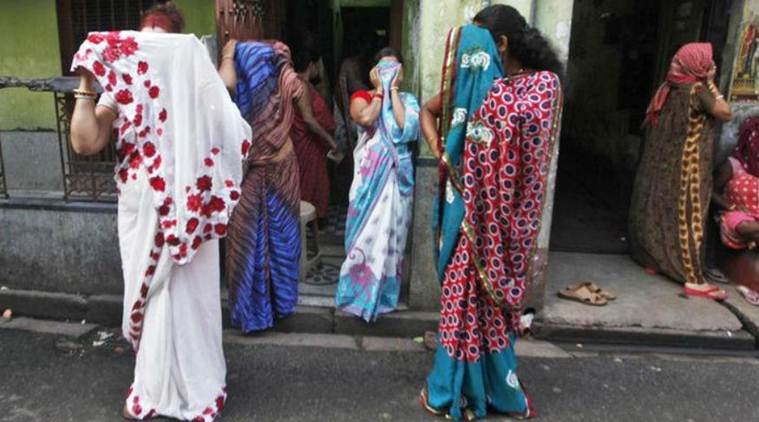
Now, how can we expect a change if the Supreme Court panel itself is of the opinion that the sex workers are leading an undignified life? The law, societal norms and the police force are together pushing the sex workers into isolation instead of liberating them.






